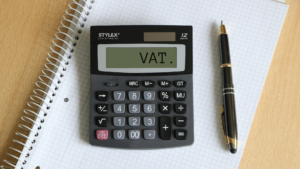Being self-employed explained

Self-employment can be a rewarding choice for people who want an alternative to being employed by someone else’s business or organisation. Being self-employed may mean you have a flexible work schedule and have more control over your income, but it’s also important to understand what it means to be self-employed. There are many aspects to consider before deciding whether or not it’s the right option for you.
An accountant can offer you a professional perspective. They can help you make important decisions when it comes to self-employment, including how to pay taxes and how to choose the best accounting software for your business.
Joanna Bookkeeping is a professional accounting practice based in Oxford, UK, offering bespoke bookkeeping and accounting services for businesses nationwide. PLUS – because our accountants are fully digital, we offer services to businesses all over the UK!
What does it mean to be self-employed?
Being self-employed means you’re responsible for running your own business and you’re not employed by someone else’s company or organisation.
You can set up and run a business in a few different ways, the types of businesses that can be owned by a self-employed person are:
- sole traders
- business partnerships
Along with the excitement and satisfaction of being your own boss comes a lot of hard work and commitment. In order to be successful, you should invest in yourself and future-proof your business. You can build a valuable long-term career with the skills, training, and knowledge gained through turning your passions into profit.
Do you need to tell HMRC you're self-employed?
If you’re self-employed, it’s a legal requirement to register with HMRC. However, the great news is that you can start trading straight away before you even inform HMRC that you’ve started your business. This is completely different from how you would register a limited company and so much easier and quicker. You can register as self-employed online and will need to provide your National Insurance number.
To set up as a sole trader, you’ll need to inform HMRC that you’ll be paying tax through Self-Assessment. This is the same part when you’re registering as self-employed. It has to be done by 5th October following the end of the tax year in which you decided to be self-employed. For example, if you become self-employed from 1st February 2022, this is in the 2021/2022 tax year (the tax year ends on 5th April). You have then until 5th October 2022 to register as a sole trader.
As a sole trader, you may also benefit from Trading Allowance. This is an amount of income you can have each year without paying any tax on it (or even reporting it to HMRC). The amount is £1,000 per year and it’s different from Personal Allowance. If you have both property income and trading income, you get £1,000 for each.
Check out our article “What Is The Trading Allowance?” for even more information.
Clear pricing and no hidden costs
Professional Help with Self-Assessment Tax Returns
Our accountants from Oxford are here to help, just contact us for more information.
Is a sole trader the same as self-Employed?
There are a lot of similarities between being a sole trader and being self-employed, but the two are not quite the same…
All sole traders are self-employed. However, not all self-employed people are sole traders, as some self-employed people are part of a business partnership.
Sole trader is a business structure like a limited company for example. As a sole trader, you run your business as a self-employed individual. It’s your responsibility to manage the responsibilities and success of your business. Whereas someone in a business partnership operates as part of a team.
What are your responsibilities as a self-employed person?
Being self-employed means you maintain full responsibility for the actions and outcomes of your business.
Your responsibilities as a self-employed person include:
- Keeping business records
- Sending a self-assessment tax return each year
- Paying income tax on profits and class 2/class 4 national insurance
- Paying tax on time
- Monitoring your VAT registration threshold
- Registering for VAT when necessary
We have a very helpful article called “7 Things You Should Know About Tax If You’re Self-Employed” that will give you some extra guidance when it comes to your tax responsibilities as a self-employed person.
We hope this article has helped you to have a deeper understanding of what it means to be self-employed, and why it’s so important to make sure you abide by all applicable laws and regulations.
If you have any questions about becoming self-employed, setting up as a sole trader, book a call with one of our accountants from Oxford. They are able to guide you through becoming self-employed and give you advice when it comes to things like choosing the right legal structure for you and your business, understanding how tax works, and making sure that everything is working as it should from the very beginning.
Frequently Asked Questions
Yes, it can in some circumstances and it's usually when you're just a start-up and are still looking to get more clients. If you continue working only for one client and have no intention to expand, you may be considered as an employee instead and if you and the company keep a self-employment arrangement, you may both face consequences of that.
Yes, absolutely with one 'but'. If you have a clause in your employment contract that prevents you from setting up your own business, you may get in trouble with the business that employs you. This would mean you're breaching the contract. But in other cases, you can definitely be both self-employed and employed. You could, for example, have a day job and work for someone else and in the evenings grow your business as self-employed.
Deciding whether your status is as a self-employed person or employed isn't purely a preference. There are certain conditions that will clearly indicate that your status is employed even if you would want to pay taxes as a self-employed person instead. You should be aware of this as sometimes some companies may ask you to register as self-employed person, so they don't have to pay taxes but the conditions of the job will be typical of normal employment. You as an individual may also pay penalties if your employment status is wrong. There is a tool on HMRC website which can help assess an employment status. It's not only one condition that determines your status as a taxpayer. You will have to take into account a whole picture and weigh the overall evidence.
More Articles
Categories

Your Accountant in Oxford
Oxford Office
Joanna Bookkeeping
The Wheelhouse Angel Court
First Floor, Angel Court
81 St Clements St
Oxford
OX4 1AW
Connect
joanna@joannabookkeeping.co.uk
01865 591952





